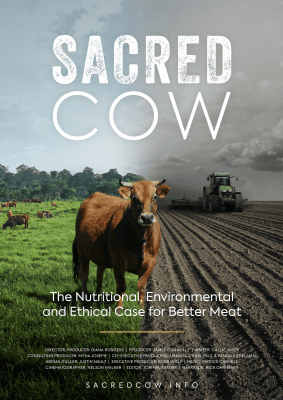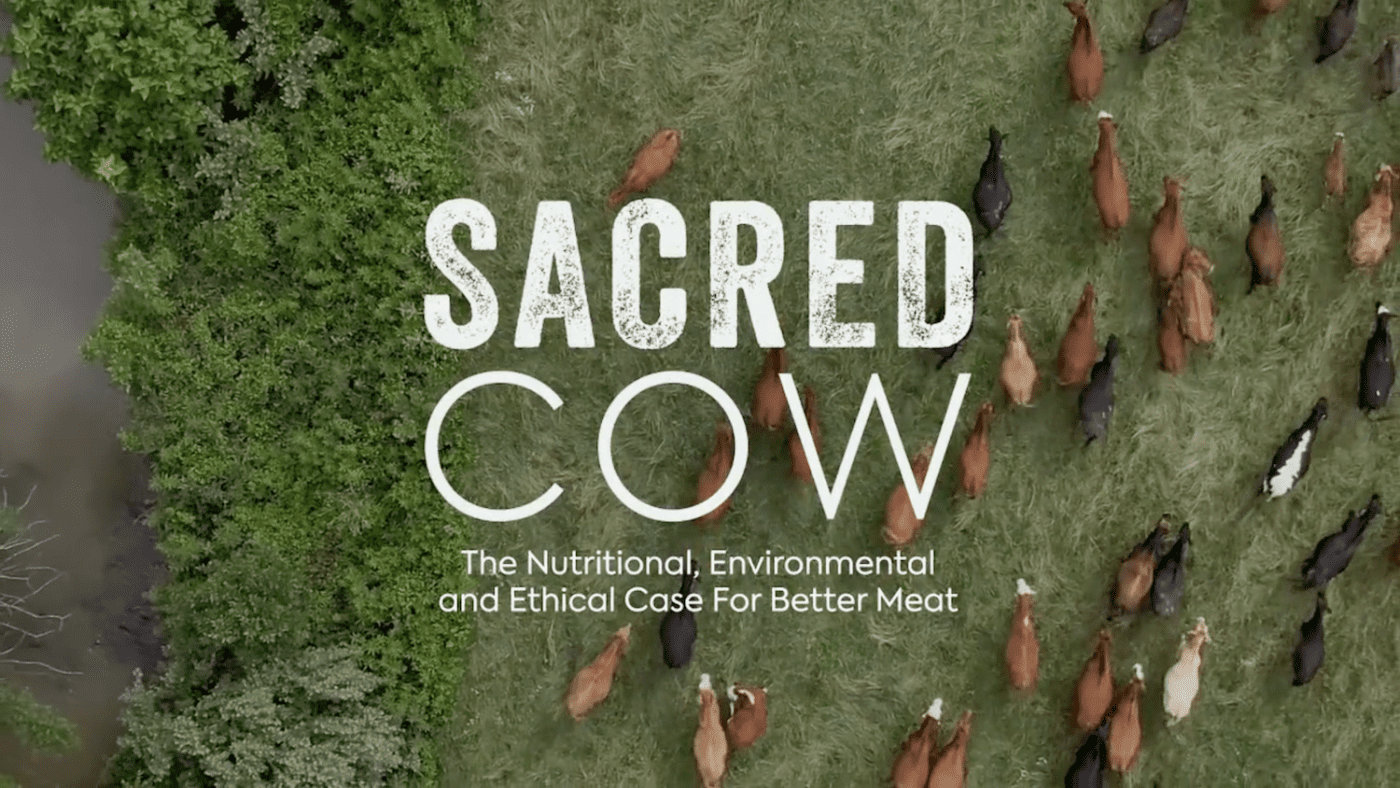In a follow up to our story on the Sacred Cow film last week, producer Diana Rodgers has provided updated details on where the film can be watched online for free through until December 6.
To view the film before that date click on this link: http://www.sacredcow.info/watch
We would love to hear what readers think – share your thoughts on the movie in our comments section below.
Original article follows:
AFTER a handful of documentaries in recent years decrying meat production on environmental, human health and animal welfare grounds, along comes one that powerfully not only dismantles the arguments against meat, but explains why animal agriculture is essential to human lives and the planet.
“We’re trying to blame meat for the modern illnesses of obesity and diabetes and cancer and heart disease,” US public health obesity researcher Dr Zoe Hurcombe says in the soon to be released film “Sacred Cow: The Nutritional, Environmental and Ethical Case for Better Meat“.
“It is far more likely that modern food is responsible for modern illness, not a substance that we have been eating for 3.5 million years.”
This is one of just several examples of neatly summarised points in the film that will capture what many in the agricultural sector have felt, as they watched first with surprise and then increasing exasperation as red meat has grown to be increasingly vilified in public and global health messaging over the past decade.
Sacred Cow, which was released for a limited preview this week ahead of a commercial release soon, is the type of film many in the agricultural sector have been waiting for, one that rationally pulls together a wide range of expertise and evidence to explain why cattle are not just not the problem causing planetary woes, but also part of the solution.
Not everyone in agriculture will agree with everything in the film, which bundles any farming system not regarded as ‘regenerative’ into a singular bad basket of ‘industrial modern agriculture’.
But on the primary point of whether it is okay for consumers to eat red meat, the film calmly and methodically walks through the various accusations that have been leveled against cattle production and beef consumption in recent years, many of which have been reported in an unquestioning way by mainstream media. In the process it draws on an impressive array of individual experts in addition to a raft of scientific evidence to demonstrate not only why the emotive-fuelled claims against animal agriculture lack evidentiary support, but why journalists really need to do their jobs and look a little harder before reporting such claims without challenge.
“There’s a debate out there about whether or not we should be eating meat,” the film opens, as narrated by US actor Nick Offerman.
“It is a debate about our planet, our ethics and our health. But what if we’re arguing about the wrong thing? What if the very animals we’re fighting about are a key piece of fixing what’s broken?”
 The film starts by exploring how agriculture and food systems have developed to where they are today. Offering regenerative agriculture as the solution, it describes a modern landscape of chemically assisted monocultures, declining soil and food nutrition, biodiversity loss, the emergence of intensive livestock production systems where waste is concentrated rather than returned to soils and the explosion in the availability of processed foods, expertly designed to tantalise tastebuds – an unintended consequence being our failing health.
The film starts by exploring how agriculture and food systems have developed to where they are today. Offering regenerative agriculture as the solution, it describes a modern landscape of chemically assisted monocultures, declining soil and food nutrition, biodiversity loss, the emergence of intensive livestock production systems where waste is concentrated rather than returned to soils and the explosion in the availability of processed foods, expertly designed to tantalise tastebuds – an unintended consequence being our failing health.
However, rather than warning people about the dangers of processed food, Government messaging and dietary guidelines instead for decades urged people to eat less fat.
In one illustrative scene a doctor explains how these dietary guidelines can play out in school lunch menus in the US: choosing the menu for one day shows students could choose lunch from an abundance of processed carbohydrates with no nutritional value including tater tots, pancakes, or baked apple slices in syrup.
“That doesn’t fill you up and it makes you want more,” Dr Tamara Hazbun from Indiana University Health points out. “The net carbs for this meal as offered by the school (and complying with US Govt nutrition guidelines) contains 23 teaspoons of sugar, almost a half of cup of sugar for lunch.”
“If you look at the 30,000 foot view of what happened in American health, we said stop eating fat, stop eating cholesterol, eat less meat, eat lean meat, and what happened?” Drew Ramsey MD, Columbia University Psychiatrist, explains in the film.
“Globally we just got really, really obese. We’ve got diabetes, we’ve got metabolic syndrome – that messaging just hasn’t worked for human health.”
When this messaging led to further declines in health, the blame shifted to red meat.
“Red meat is now worse for us in our minds than fat ever could have been because there are so many more reasons to avoid red meat, not only for your health, but also now for the goodness of others including not killing animals and for the good of the planet,” Nina Teicholz, author of the Big Fat Surprise, tells the film.
The film explores and addresses each of these points in depth.
Lierre Kieth, author of 2009 book the Vegetarian Myth, is an ex-vegan who describes how her urban upbringing, disconnected from agriculture, led her to people who convincingly espoused a non-meat diet, but how since then veganism has seriously damaged her health and that of others.
She explains that veganism can become such a core part of a person’s identity that it makes it hard to question facts that don’t support their beliefs.
“The thing about being a vegan is that it is not just what you eat, it becomes who you are,” she said.
“For most of us anyway, it really becomes the main sense of our identity is being a vegan.
“And what that means it is its really hard to absorb counter information, anything that would be threatening to that vegan world view really feels like it is a threat to who you are.”
Dr Zoe Harcombe adds that while there are some people who seem to be healthy on a vegan diet, for most people “it is only a matter of time before something in their health suffers and it drives them away from their vegan diet”.
‘It is only a matter of time before something in their suffers and it drives them away from a vegan diet’
Essential nutrients like B12 can only be found in animal foods while other nutrients like iron, zinc, calcium and long chain fatty acids may be found in plant foods but are much more ‘bio-available’ (more absorbable) from animal foods, Chris Kresser, co-director of the California Centre for Function Medicines, explains.
“Supplements often don’t come in the same form that you would get if you eat that nutrient in food,” he said.
“Getting nutrients from food should always be the first choice.”
You can’t blame people for being confused
Despite clear evidence that red meat provides essential nutrition you can’t blame people for being confused, narrator Nick Offerman points out.
People hear from news reports that ‘eating red meat as bad for you as smoking cigarettes’, which Chris Kesser notes is “absolutely presposterous”, but the same news reports don’t point out that such study findings are the result of observational studies, which do not prove direct cause.
“It is not the meat itself, it is what the meat is eaten with,” Mark Hyman MD, from the Cleveland Clinic for Functional Medicine, says.
“We have unfortunately vilified meat where there really is no strong evidence that we should.”
‘We have unfortunately vilified meat where there really is no strong evidence that we should.’
The film systematically debunks claims that cattle are destroying the planet, citing the work of scientists such independent world leading air quality expert Dr Frank Mitloehner from the University of California Davis and cattle methane researcher Jason Rowntree, an associate professor of Animal Science at Michigan State University.
“The notion that a cow fart is ruining society is just such an unfortunate misinterpretation of the real science, the real beauty and the real ecology of the system,” Mr Rowntree said.
‘The notion that a cow fart is ruining society is just such an unfortunate misinterpretation of the real science’
One young livestock farmer from Rhode Island, Ben Coerper, recalls that his time working on vegetable farms confirmed to him the degree to which plant based systems still rely heavily on animal agriculture to provide manure and/or blood and bone meal to put nutrients into the soil.
“If you don’t have animals you still have got to put nutrients in the soil somehow,” Ben Coerper says.
“There isn’t three feet of topsoil in the mid-west because farmers were growing kale for 2000 years.
“It is because there were bison roaming the plains and pooping.
“And once I realised that I was like, well I’ve got to learn how to grow animal then.”
In response to the rising activism around food production, James Rebanks, a British farmer and author of ‘English Pastoral’, comments that a key issue in modern life is that generations of people are now far removed from the ‘soil, blood, killing, and growing anything’ reality of producing food.
“No body thought this through – what will people think about food if they have never had any contact with it?,” he says.
“And there’s a lot of people who are just very confused and they’re trying to make really important moral decisions about what they should eat and how they should live, but it is quite hard to make important moral and ethical decisions if you don’t know very much. It is easy for fall for extreme simple answers.”
US farmer, lecturer, and author Joel Salatin tells the film that the level of activism around meat production today shows “an incredible devolution in our society to disconnectedness”.
The film points out that some people argue that rather than change the system we should just get rid of cows and produce meat another way.
Robb Wolff, author of the The Paleo Solution and Wired to Eat, says the irony to the notion of selling lab grown meat as a sustainable option is that nobody asked the question where do the nutrients come from to produce it?
“The inputs are provided by row crop centric agriculture which are grown with fossil fuel inputs and then introduced into a lab, then they are massively processed into vats of essentially biological goo.
“Somehow that is being marketed as a sustainable option.”
The film also concentrates heavily on the science and evidence showing that cows can and should be used as an ecological management tool. Joel Salatin points out that “all deep soils on the planet developed under prairies because of the herbivore”.
‘all deep soils on the planet developed under prairies because of the herbivore’
The critical role ruminant livestock play in our food supply by “upcyling” grasses and legumes on that marginal land into nutrient packed protein is also emphasised.
“If it weren’t for ruminant livestock we would effectively not make use of the majority of agriculture land in the world,” Dr Frank Mitloehner says.
“If you took the grazing away it would create a gaping hole in the food system of the highest quality most nutrient dense food available, there would be no food production on those areas,” Nicolette Hahn Niman, author of Defending Beef, adds.
Sacred Cow visits a Global Roundtable for Sustainable Beef conference in Kansas and highlights the integral role livestock and meat play in countries of Africa, where studies have shown that just adding a little bit of meat to the diets of children increased their school test scores by 45 percent.
The film also documents how Mexican ranchers in the Chihuahuan Desert, who grew up knowing nothing but constant drought, now successfully establishing grasslands by using cattle to mimic what nature used to do with roaming ruminant herds, and demonstrating that these practices can work in areas of significant scale.
“The reality is it is not the cow itself, it is how we manage the cow,” Allejandro Carillo says.
“If we manage the cow in the way that it will mimic nature it will help us restore these huge tracts of land that are already degraded.”
 Behind the film is Diana Rodgers (right), a registered dietitian and sustainability advocate, who earlier this year published a book: Sacred Cow: the case for (better) meat, co-authored with Robb Wolf, author of the book The Paleo Solution.
Behind the film is Diana Rodgers (right), a registered dietitian and sustainability advocate, who earlier this year published a book: Sacred Cow: the case for (better) meat, co-authored with Robb Wolf, author of the book The Paleo Solution.
Sacred Cow probes the fundamental moral, environmental and nutritional quandaries people face in raising and eating animals.
It provides much-needed clarity for consumers on a wide range of common assumptions such as red meat causes cancer, obesity and heart disease; people are eating too much meat; humans don’t need to consume animal products to be healthy; raising livestock is bad for the environment it is unethical to eat animals and that lab-produced foods are a better alternatively to natural raised meat.
This article is a broad overview that skips much of the detail and other key points which are comprehensively dealt with in the 80 minute program – anyone who is genuinely interested in understanding the real issues around meat production and consumption is thoroughly recommended to watch the movie when it becomes commercially available.
We will keep our readers informed and up to date when that happens – sign up to receive our free beef news email to stay in touch.

